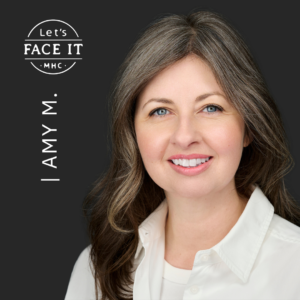Many creators are outcome-focused. Artist Amy McNamara hopes to help people realize that the process itself is potentially just as — perhaps even more — valuable than any end result.
McNamara had been creating art for decades before having this epiphany during the pandemic. Her husband of 20+ years had moved out their home and she found herself unmoored.
“I was left at home in this middle place,” she says of that time, ”Thank goodness for that spark inside me that told me I wanted to be fluent in images and moved me toward the art therapy program at Albertus Magnus.” McNamara is currently pursuing her master’s degree in art therapy.
McNamara developed her new new thinking about the creative process as part of her educational journey. Now she, and her studio partner, Briah Luckey, who is also an art therapist and artist, are eager to help people access their creativity at their new studio, @CreateSpace in New Haven.
“It’s about expression. It’s about being witnessed. It’s about being in community. It’s about self-soothing and self-regulating through the art materials & processes,” she says of thinking about the creative process in this new way. “It’s also a lot about having fun and playing. It sounds so trite but it’s so magical. It’s that 5-year-old self, being curious and exploring. We try to create a space that welcomes that.”
“So much self-discovery can be mined through the artistic process- accessing this part of people that’s largely subconscious,” she adds. “It has its own intelligence to it. It’s benevolent in a way. It wants to heal us I believe.”
This way of thinking about making art can also, McNamara says, help destigmatize the creative process. “If I had a nickel for every time a person says, ‘I can’t even draw a straight line,’ and I say, ‘Great! That’s exactly what we want — beginner’s mind.’ As a practiced creative person, I often long for that first encounter with the materials.”
Sharing her story, she hopes, can help others become more brave about using art in managing their daily lives. The studio, which provides the space, the materials and the strategy for letting the creative process happen, currently is especially focused on helping healthcare professionals who are on the front lines of the continuing pandemic. “We’re calling it Oxygen Mask. A space for these folks to come together and replenish themselves,” McNamara says. “What we’re seeing is so many of these folks who have been on the front lines of mental health during this exhaustive time need respite. They need to be seen and helped.”
McNamara already sees the difference this approach can make. McNamara is offering a weekly arts group for the professionals who work at New Reach in New Haven and help people who are experiencing homelessness. “I’m helping them build skills and different tactics to calm themselves,” she says. “The feedback I’m getting from people is that they look forward to this all week. They can share it with a client or friend or whatever. That’s how we take care of each other.”
McNamara has lived the power of what she preaches. During the pandemic, she says, “I had the words knocked out of me. I felt speechless.” Inspired by the words of Sarah Faith Gottesdiener, an artist, designer, teacher and tarot reader, she began to develop her signature process, Magic Loves a Void, which involves journaling and then using Gelli print on top of journal pages to help understand her emotions. McNamara then screenprints a phrase or word to reclaim her lost words.
“I felt like that was how I found my words again,” she says. “I found my voice. I steadied myself through the processing of this art.” And now she hopes to help others find their voice, too.
Instagram: @AmosCatfish



